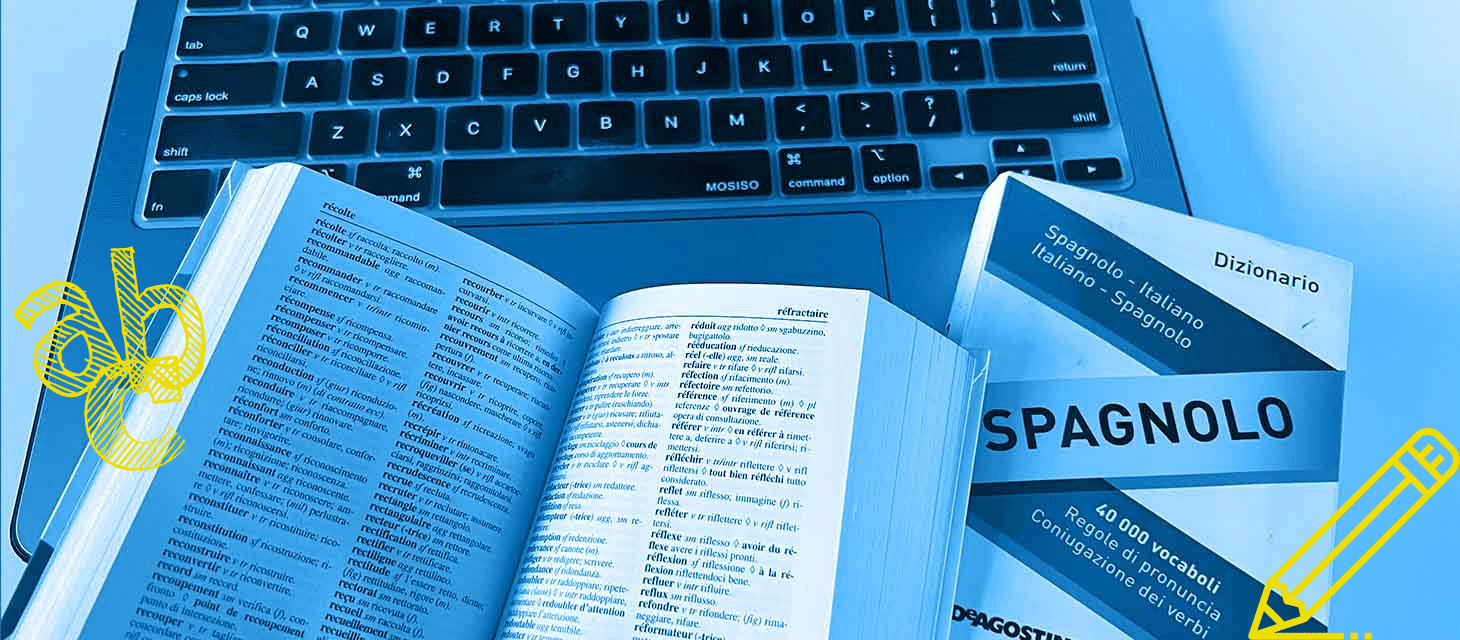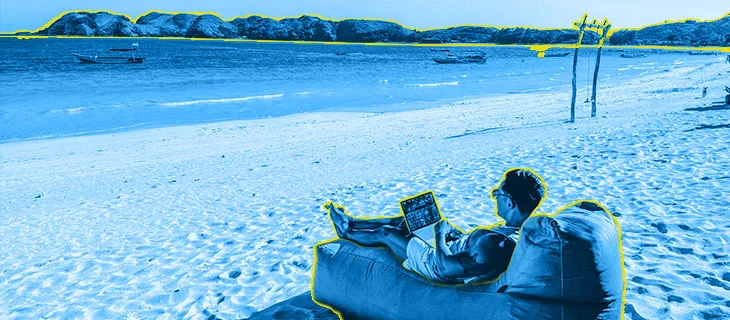How to Become a Translator as a Digital Nomad

For people who travel full-time as a lifestyle, being a translator is an ideal digital nomad job as it can be remote and revolutionary.
You can be anywhere in the world to do it and change how people communicate with languages used worldwide.
You’ll learn how to become a translator as a digital nomad from one of the leading language service providers in this article.
Ofer Tirosh, CEO of Tomedes translation company has worked with over 20,000 global translators and has offered his advice and insight into how to become a translator.
Tomedes is a good resource for translators, because they’re remote, operating online; restless, in striving to be the best; and revolutionary, for their work in preserving language equity through translation.
What resulted from my conversations with this language service provider? Read on to find out more.
Why Should You Become a Translator?
First, we need to have a refresher from our linguistics courses in college. What’s a translator? A translator is someone who converts documents from one language to another. This means that a translator must be knowledgeable, if not fluent, of at least two languages.
What does a translator do? According to Indeed, “a translator assists in the written word from one language to another. They usually specialize in two languages—their native language and another chosen language—but may also specialize in a third or fourth language. A successful translator makes sure the message, ideas and facts remain accurate and the same throughout the process.”
A translator is someone who facilitates the transmission of information from their native language to another language, making sure that nothing is “lost” in translation. Translators are intermediaries of textual communication, making information more accessible to those who speak another language.
Speaking of languages and why translators are necessary, out of 7,139 languages being spoken today, English, Chinese, and Spanish are the most widely used. This means writings and documents in other languages must be transformed into these three languages to get the most traction on the internet. And who does that? A translator.
Research shows that the top ten languages of the world are Chinese, Hindi, English, Spanish, Arabic, Portuguese, Bengali, Japanese, German, and Russian, which a majority of the world’s population speak. It’s beneficial that a translator knows any two of these languages to be successful.
Why is being a translator so fit for a digital nomad? Regardless of all the translation apps out there, businesses are still looking for the human touch by a human translator, especially for documents for business communication.
5 Questions on The Road to Becoming a Translator
1. How to Learn New Languages?
If you’re going to be a translator, you’ll need to learn a language. That means new grammatical rules (to break), new vocabulary, and new phrases (bonus points for pronunciation). According to an article by FluentU, a language learning app, the fastest, most direct way to learn a new language is:
- Set Language Learning Goals – Learning a new language doesn’t have to happen overnight. You could practice while on a hammock in the Caribbean or in a café in Paris. But the important thing is that you keep at it, and you set goals for yourself.
- Learn the Right Words – If there’s a shortcut to learning a new language, it’s knowing the common words in that language and learning it. This will prove useful in translation skills as well.
- Study Smart – Another shortcut to learning a new language is studying smart. Instead of cramming, try flashcards or an app, which lets you learn gradually.
You don’t necessarily need a degree, though that might be useful in this competitive world. The most essential skill you need to become a translator is to be bilingual. And to do that, immerse yourself in the languages you’re translating to and from.
2. How to Learn to Translate?
Learning to translate is being able to familiarize yourself with context; not just the context of the language, but all aspects of the national, socioeconomic contexts of the language. When you become a translator, you can expect to perform and know the following:
- Speaking, reading and writing fluently in two or more languages
- Translation of written documents and content, either online or offline
- Knowing the linguistic, cultural and socioeconomic contexts of two or more languages
- Comfortable with the slang of the languages and can accurately convey from one language to another
- Have the ability to build glossaries, terminology, or technical jargon of the languages.
- Knowing how to communicate in the preferred languages with businesses and clients.
- Acutely maintain the style and tone of the text they’re translating
- Have industry expertise in a specialized industry
Tirosh adds, “Translators in our company are not simply translating–they’re also industry experts in the business domain of the client. They are website translators, marketing translators, literary translators, and more. If we find that the client is an education business in Canada, we provide a translator who knows the Canadian language, and is also specializing in education.”
So, there you have it: learning to translate also has its specializations. This means that when you enter the field of translation, you also should have a background in a secondary field. Learning to translate is not necessarily just about languages, but also about business fields popular with those languages.
3. How to Get a Job as a Translator?
If you’re a digital nomad, you’re probably thinking to yourself, can I become a translator remotely? Yes, you can!
Most language companies are remote. You can pursue translator listings online, on such platforms as Indeed, LinkedIn, or Upwork.
But before that, you should familiarize yourself with the translation industry. CSA Research is a research company that’s knowledgeable about the aspects of the translation industry, and reading their articles might prove useful for knowing this industry from inside and out.
Ethnologue is also another company that publishes information on languages and their impact on the world.
Translation service providers are always hiring new talent and cultivating the best talents. They cater primarily to business clients and are a B2B company. Being a translator at this type of company would entail working with business clients to further their global goals.
Here are some surefire ways on how to get a job as a translator:
- Market Yourself – To become a successful translate, you must market yourself as a translator or linguist. If you have the degree, the qualifications, or translating experience, then definitely market yourself to the worldwide market. If you have none of those but the gusto, there are entry-level positions for translation. The great thing about translation is almost always high demand.
- Get Specialized Training – If you’re looking into a remote degree, the ATA (American Translators Association) has approved schools which offer specialized degrees for which the ATA issues certifications.
- Be Knowledgeable in a Specific Industry – As mentioned before, translators should have be specialized in a field aside from the specialized knowledge of languages. Learning industry standards and industry terminology, for example the technology industry, would make you more attuned as a translator for that industry.
- Know Specialized Technology – Translation companies like Tomedes use CrowdIn, MemoQ, and SDL Trados, and are looking for these types of technology skills in their translators.
- Attain Experience – Freelance translators are often on Fiverr and Upwork, remote companies themselves who always have listings for freelance work in translation.
4. How to Become a Certified Translator?
But the best way to become a translator, according to Tirosh, is to get certified. Their company uses certified translators who have the qualifications, experience, and specifications for certified translators.
Becoming a certified translator requires many qualifying exams, but it does get traction on your CV. There are different ways of becoming a certified translator as a digital nomad, but it depends on where you’re from.
For those from the US, the ATA issues a special designation as an ATA-certified translator. Aspiring translators simply take a qualifying exam, and if they pass, they will be designated with a sealed certificate of their certification.
In Australia, the NAATI is the governing body that issues a certificate as well, for certified translators in that country.
In the UK, there is no official sworn translator, but they do have distinctions for certified, legalized, or apostilled translators.
Becoming a certified translator is an arduous process with many requirements. Often mid-career translators obtain a certification. It is meant to be for mid-career translators. That said, if you qualify, getting a certification as a translator definitely would give you a boost in the hiring process.
5. Keep Learning
Becoming a linguistic translator is a continuous process. To grow your career, you will need to continuously learn new languages, new processes in your industry, and maybe even new industries. Professional translators are professionals who know the ins and outs of the translation industry, of their languages and nations, and of the industry they’ve specialized in.
Why Is Becoming a Translator Important for Digital Nomads?
Digital nomads are curious about the world around them. What better way to experience the world than by learning the intricacies of different languages? Digital nomads are a perfect fit for translation because they are forever learning about new environments.
Being a translator is the perfect job for digital nomads as it can be done virtually anywhere with a WiFi connection. The culture of the travels that digital nomads experience could also make for cultural contexts of a linguistic nature.
A digital nomad versed in the digital world could also have perks as a translator. Knowing technical jargon is essential as a technical translator. Knowing bitcoin is necessary for a financial translator. And so, the richness in the digital world could transform into a job opportunity for the restless nomad.
Constantly adapting to change is also a mark of the digital nomad and the translator. Since there could be fluctuations in the language (the non-binary “they” has finally reached the dictionary) or in treading cultural topics, translators are always adapting to changes in their countries, environments, and industries.
No Bumps in the Road to Translation
What’s a better way to become a translator than by being what you already are: a digital nomad? If this article has helped you in any way, I hope it has brought you closer to your dream job.
Becoming a translator can be easy when you’ve achieved the right specifications. But in order to even step towards the right specifications, you should have the gusto for languages and the impact they can bring on the world. It truly can revolutionize the world to be a better place, and that’s a dream both digital nomads and translators have in common.
And remember, professional services companies have their eyes wide open for you. Happy translating!
You may also enjoy

The most complex and time-consuming part of applying for a digital nomad visa is gathering all of the right documents. To help get you started and hopefully save some time,…
by Brittany

Taiwan will be the latest country in Asia to welcome remote workers officially by introducing the Taiwan digital nomad visa. In an effort to attract at least 10% of the…
by Brittany

As a remote worker traveling the world, you’ve likely heard about the more than 40 digital nomad visas available worldwide. They’ve piqued your interest, but what are the signs you…
by Brittany
